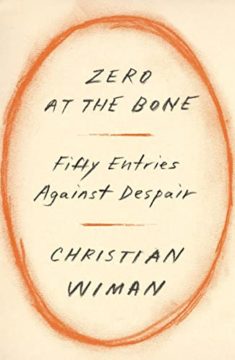Alexandra Jacobs at the New York Times:
 Much of “Zero at the Bone” is set a long way from Yale: in the hot, flat, scrubby towns of Texas where Wiman grew up, the apparent golden child of a deeply tarnished family, “my father vanishing, my mother wracked with rage and faith, my siblings sinking into drugs and alcohol, my own mind burning at night like an oil fire on water.” (He mentions only briefly an opiate addiction of his own, and spends maybe a little too much time recapping an abandoned bildungsroman in service of the theory that God is a failed novelist “who seems conflicted about how — or whether — to finish us.”)
Much of “Zero at the Bone” is set a long way from Yale: in the hot, flat, scrubby towns of Texas where Wiman grew up, the apparent golden child of a deeply tarnished family, “my father vanishing, my mother wracked with rage and faith, my siblings sinking into drugs and alcohol, my own mind burning at night like an oil fire on water.” (He mentions only briefly an opiate addiction of his own, and spends maybe a little too much time recapping an abandoned bildungsroman in service of the theory that God is a failed novelist “who seems conflicted about how — or whether — to finish us.”)
Along with humanity’s end in the main, Wiman has been forced to confront his own end in the particular. His refusal to submit to America’s “cancer camaraderie,” instead trying to explain the “otherworldly intimacy” of its pain, reminded me of Barbara Ehrenreich. “Through the rooms/the white minders come and go/with their upbeat and their bags of blood,” he writes Prufrockishly of hospital treatment.
more here.
